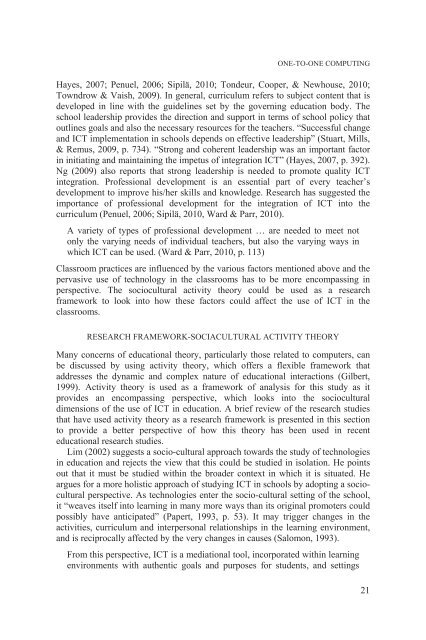1517-creating-holistic-technology-enhanced-learning-experiences
1517-creating-holistic-technology-enhanced-learning-experiences
1517-creating-holistic-technology-enhanced-learning-experiences
You also want an ePaper? Increase the reach of your titles
YUMPU automatically turns print PDFs into web optimized ePapers that Google loves.
ONE-TO-ONE COMPUTING<br />
Hayes, 2007; Penuel, 2006; Sipilä, 2010; Tondeur, Cooper, & Newhouse, 2010;<br />
Towndrow & Vaish, 2009). In general, curriculum refers to subject content that is<br />
developed in line with the guidelines set by the governing education body. The<br />
school leadership provides the direction and support in terms of school policy that<br />
outlines goals and also the necessary resources for the teachers. “Successful change<br />
and ICT implementation in schools depends on effective leadership” (Stuart, Mills,<br />
& Remus, 2009, p. 734). “Strong and coherent leadership was an important factor<br />
in initiating and maintaining the impetus of integration ICT” (Hayes, 2007, p. 392).<br />
Ng (2009) also reports that strong leadership is needed to promote quality ICT<br />
integration. Professional development is an essential part of every teacher’s<br />
development to improve his/her skills and knowledge. Research has suggested the<br />
importance of professional development for the integration of ICT into the<br />
curriculum (Penuel, 2006; Sipilä, 2010, Ward & Parr, 2010).<br />
A variety of types of professional development … are needed to meet not<br />
only the varying needs of individual teachers, but also the varying ways in<br />
which ICT can be used. (Ward & Parr, 2010, p. 113)<br />
Classroom practices are influenced by the various factors mentioned above and the<br />
pervasive use of <strong>technology</strong> in the classrooms has to be more encompassing in<br />
perspective. The sociocultural activity theory could be used as a research<br />
framework to look into how these factors could affect the use of ICT in the<br />
classrooms.<br />
RESEARCH FRAMEWORK-SOCIACULTURAL ACTIVITY THEORY<br />
Many concerns of educational theory, particularly those related to computers, can<br />
be discussed by using activity theory, which offers a flexible framework that<br />
addresses the dynamic and complex nature of educational interactions (Gilbert,<br />
1999). Activity theory is used as a framework of analysis for this study as it<br />
provides an encompassing perspective, which looks into the sociocultural<br />
dimensions of the use of ICT in education. A brief review of the research studies<br />
that have used activity theory as a research framework is presented in this section<br />
to provide a better perspective of how this theory has been used in recent<br />
educational research studies.<br />
Lim (2002) suggests a socio-cultural approach towards the study of technologies<br />
in education and rejects the view that this could be studied in isolation. He points<br />
out that it must be studied within the broader context in which it is situated. He<br />
argues for a more <strong>holistic</strong> approach of studying ICT in schools by adopting a sociocultural<br />
perspective. As technologies enter the socio-cultural setting of the school,<br />
it “weaves itself into <strong>learning</strong> in many more ways than its original promoters could<br />
possibly have anticipated” (Papert, 1993, p. 53). It may trigger changes in the<br />
activities, curriculum and interpersonal relationships in the <strong>learning</strong> environment,<br />
and is reciprocally affected by the very changes in causes (Salomon, 1993).<br />
From this perspective, ICT is a mediational tool, incorporated within <strong>learning</strong><br />
environments with authentic goals and purposes for students, and settings<br />
21


